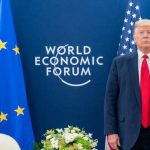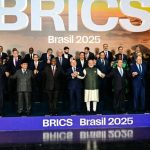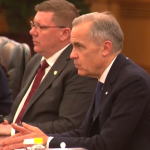A U.S. appeals court ruled Aug. 29 that most of President Donald Trump’s tariffs are illegal, saying that he exceeded his authority, but the judges let the import taxes stay in place while allowing the case to be sent back to a lower court.
In a 7-4 ruling, the U.S. Court of Appeals for the Federal Circuit ruled that Trump’s reciprocal tariffs unveiled in April are mostly illegal.
The appeals court upheld a ruling handed down by the Court of International Trade earlier this year, saying that the president incorrectly used his emergency powers to issue the tariffs.
A majority of judges on the federal appeals court found the president overstepped his authority under a 1977 law called the International Emergency Economic Powers Act (IEEPA).
“The statute bestows significant authority on the President to undertake a number of actions in response to a declared national emergency, but none of these actions explicitly include the power to impose tariffs, duties, or the like, or the power to tax,” the court stated.
The court also said that it appears to be “unlikely that Congress intended, in enacting IEEPA, to depart from its past practice and grant the President unlimited authority to impose tariffs.”
“The statute neither mentions tariffs (or any of its synonyms) nor has procedural safeguards that contain clear limits on the President’s power to impose tariffs,” the judges added Friday.
Friday’s ruling will not take effect until Oct. 14, allowing the Trump administration to appeal the decision to the U.S. Supreme Court.
Trump has made tariffs a pillar of U.S. foreign policy in his second term, saying they are a way to correct what he said are unfair trade practices by countries that export goods to the United States and to reshore manufacturing. He also used tariffs to target issues of drug trafficking, border security, and illegal immigration.
The tariffs have given the Trump administration leverage to extract economic concessions from trading partners but have also increased volatility in financial markets.
“ALL TARIFFS ARE STILL IN EFFECT,” he wrote. “Today a Highly Partisan Appeals Court incorrectly said that our Tariffs should be removed, but they know the United States of America will win in the end.”
“The U.S.A. will no longer tolerate enormous Trade Deficits and unfair Tariffs and Non Tariff Trade Barriers imposed by other Countries, friend or foe, that undermine our Manufacturers, Farmers, and everyone else,” he added.
He also invoked the spirit of Labor Day weekend, asking Americans to remember that tariffs were the best way to “help our Workers, and support Companies that produce great MADE IN AMERICA products.”
The president on Aug. 8 also warned on social media that serious economic consequences could follow if the court blocked the tariffs and the government from obtaining that revenue.
In April, Trump declared a national emergency because the U.S. imports much more than it exports, a phenomenon that has lasted for decades. Trump said the persistent trade deficit was undermining U.S. manufacturing capability and military readiness.
The president also said the tariffs against China, Canada, and Mexico were necessary to stop the flow of fentanyl and illegal immigrants from entering the United States.
The court’s decision on Friday does not impact tariffs issued under other legal authority, including Trump’s levies on steel and aluminum imports.
U.S. Attorney General Pam Bondi on Aug. 29 said that the Department of Justice will appeal the judges’ decision.
“The judges of the Federal Circuit are interfering with the President’s vital and constitutionally central role in foreign policy. This decision is wrong and undermines the United States on the world stage.”











